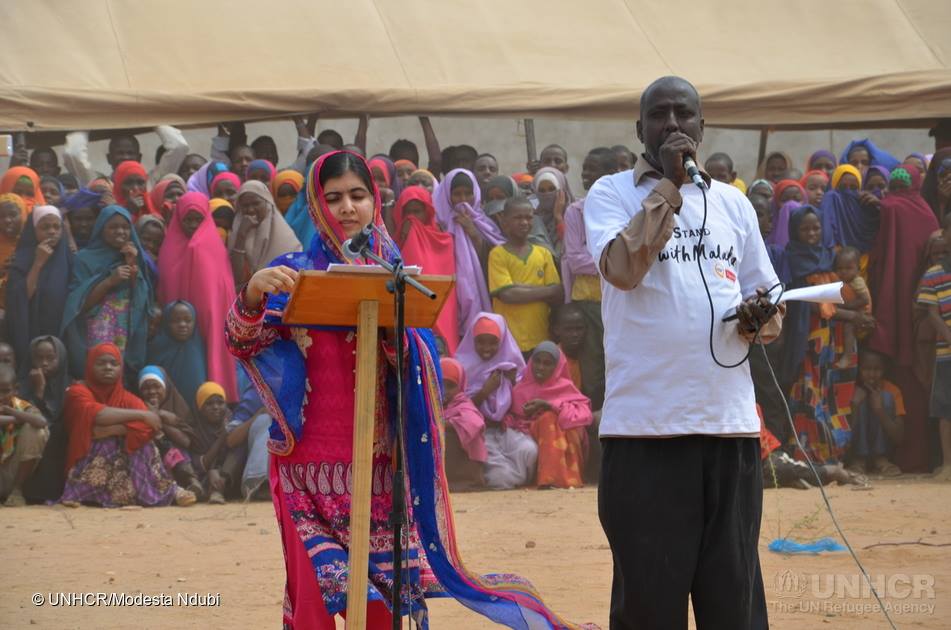“I promise to use my voice to tell your stories”
DADAAB, Kenya – “Today I turn 19 years old and I am here to speak on behalf of my unheard sisters of Somalia striving to get an education,” said Malala Yousafzai, the youngest Nobel Peace Prize Laureate and an advocate for girls’ education.
Amid the scorching sun, Malala braved the dusty and windy afternoon to encourage and cheer on girls pursuing education under difficult conditions. “We cannot talk about peace without your voice. I’m here to stand with you, as someone who knows how it is to flee their home in the middle of the night,” she said.
“We cannot talk about peace without your voice”
Incidentally, this was her first visit to Dadaab that also coincided with her birthday, ‘Malala Day’, and the graduation of 75 refugee girls that have been undergoing a mentorship program on leadership and life skills with support from Malala Fund. The ceremony which was also attended by UNHCR Representative Raouf Mazou was held at the Juba Indoor Sports Complex located in Dagahaley, one of the 5 camps that make up Dadaab complex. Malala symbolically handed over certificates to five of the girls who were graduating.
The education campaigner said she chooses to visit different regions where girls’ education has been neglected to celebrate her birthday. At 17, she spoke on behalf of Nigerian girls and at 18 she was championing for the rights of Syrian girls.

Malala addressing the gathering at Juba Sports Complex in Dagahaley
“You have challenged society and you are heroes. I salute you for your courage,” Malala told Dadaab refugee camp girls. Out of the more than 340,000 refugees in the camp, 50% are school going children aged 3-17 years with an average enrolment of 61%. Of the 86,914 enrolled in education, 41% are girls.
“You have challenged society and you are heroes. I salute you for your courage”
Malala pointed out that 8.5 billion dollars a year could ensure that children affected by conflict go to school but unfortunately that was not the case. “This is my dream today and every day. I urge you to join me in my campaign. Education is a right for all girls.”
In one of the listening sessions held with parents, teachers and community leaders to address education in Dadaab camp, Nyamoch, a South Sudanese, while talking on behalf of other girls said, “Girls in this camp face many challenges such as early marriage, poverty and lack of women role models in society. “I promise to use my voice to tell your stories,” Malala told the students.
Malala, an advocate of girl child education, could not help but worry about girls going back to Somalia especially if infrastructure such as schools and hospitals are not in place. She cited the example of Rahma, a Somali refugee whose thirst for education led her back to Kenya after her entire family voluntarily returned to Somalia in 2015. A champion for education in her own right, Rahma has been encouraging girls in Dadaab to embrace education and better their lives. She was also one of the jewels picked among many girls to receive Malala on arrival at the Dadaab airstrip and accompanied her on every stop and meeting during the Nobel Laureate’s visit. Rahma, who looks up to Malala, urged her fellow refugee girls to ‘Be smart and brave to achieve your goals.’
While acknowledging the support of the international community in refugee management, she urged for more scholarships. ‘The young people in this camp are the future leaders whom we depend on for peace. I believe that every girl is entitled to quality education. But this world isn’t listening. The world needs to recognize that it’s not these children faults that they became refugees,’ said Malala.
Malala’s father Ziauddin Yousafzai, an educationist, who accompanied her to Dadaab encouraged the girls to be brave enough to stand up for their rights.
Share on Facebook Share on Twitter